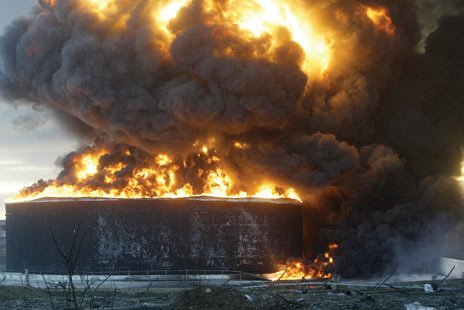Offshore: Learning from past mistakes
By Jon Cooper and Steven Brooker:

The underlying cause of the Buncefield explosion was systemic
Last year HSE chair Judith Hackitt commented at the Piper 25 conference that, “there are no new accidents, only old accidents repeated by new people”.
This sentiment is echoed in the HSE’s recently published report on its Ageing and Life Extension programme (KP4). Following 33 onshore and offshore inspections, the HSE’s report covers the Ageing and Life Extension (‘ALE’) challenges facing hydrocarbon exploration and production installations.
Approximately half of the fixed platforms in the UK’s Continental Shelf (UKCS) are approaching or have already exceeded their anticipated field life. Commentators have for some time been discussing the challenges created by installations operating for a longer period of time than originally intended, and the likelihood of a further five years for decommissioning. These challenges relate to both safety issues, and also to increased costs.
The report rightly points out that installation age is not necessarily a reliable indicator of condition, and that true understanding of the condition of ageing assets comes from advanced and continuing assessment of safety critical elements.
What is particularly striking about the KP4 report on ageing and life extension offshore is the strong sense of déjà vu following the Buncefield explosion and fires in 2005, the biggest oil terminal explosion in peacetime Europe. Having worked on the Buncefield prosecution case, the similarities struck us particularly hard.
The primary causes of the overfilling of the fuel storage tank at the Buncefield depot in 2005 were a fuel level gauge that kept sticking and a malfunctioning safety cut-off switch. However, the underlying causes were systemic. These causes were – a failure to identify safety critical elements (the tank gauge and the cut-off switch); a failure to trend the performance of those safety critical elements to identify when those elements might fail; acceptance of a ‘fix on fail’ approach to maintenance; insufficiently close collaboration with suppliers in terms of components; and a failure to identify and manage ‘creeping change’.
While these issues were widely publicised in HSE reports about the lessons learned following the Buncefield incident and in the subsequent prosecutions, they are the same issues identified by HSE in the KP4 report as requiring improvement in the context of ALE offshore.
The KP4 findings include phrases like ‘insufficient use of data trending to enable forecasting of when equipment is likely to fail its criteria of non-conformance’ and ‘insufficient plans in place to manage the consequences of creeping change’, both remarkably similar to the language used in the Buncefield findings.
The recommendations made by KP4 stay in the same vein. They include improving focus on obsolescence management; developing KPIs to help prevent future loss of integrity; undertaking periodic ALE management audits; and improved data management and data trend analysis.
The continued operation of the offshore assets on the UKCS is clearly in the national interest and the interest of business, but we must not lose sight of the safety imperatives among the need for commercial gain.
The potential consequences of deterioration due to ageing could be very serious indeed, and effective ALE management is therefore essential. Operators and contractors need to fully understand asset condition, the factors that affect it, and how to protect against degradation. It is vital that procedures are in place to monitor, measure and analyse data in order to spot issues before they become serious, and remedy them at the earliest possible opportunity.
One barrier to greater uptake of effective ALE management could be increasing tension between the treatment of ageing assets and compliance with new regulations following the EU Offshore Safety Directive published in June last year. The government’s draft proposals published this summer on how to implement the directive were aimed at improving the current offshore safety regime, but they raise some serious concerns.
Even prior to the consultation process, the industry has voiced opposition to some of the proposals that are likely to find their way into UK law. One such proposal is changing the concept of what is termed ‘the operator’ under the new regime, a change that will involve the licensing authority appointing ‘operators’ on the industry’s behalf, something that they do not necessarily have the skills and understanding to do.
The industry view is that this would detract from existing standards and that it fundamentally fails to recognise the role of contractors in offshore operations. It has been a principle of health and safety law in this country for many years that the responsibility for managing the risks associated with a given activity should sit with those companies that have the greatest control of the risks in question.
For certain specialist activities, legal duties under the draft regulations for health, safety and the environment will be focused on the new ‘operator’ instead of the specialist contractors, even though it is those contractors who will continue to exert the most immediate control over their activities and the associated risks. Such a change introduces an element of doubt into the effectiveness of the new regime.
But whatever the complications posed by the implementation of the EU directive and who holds responsibility for risks under the new regime, the importance of ALE management is vital. And while KP4 makes several recommendations in relation to ALE, perhaps the key recommendation should be for industry to demonstrate that they have learnt from the old accidents to ensure that new people do not repeat them.
Jon Cooper is a partner that specialises in health, safety and environment and Steven Brooker is a senior associate in the regulatory team at Bond Dickinson.
Offshore: Learning from past mistakes
By Jon Cooper and Steven Brooker: Last year HSE chair Judith Hackitt commented at the Piper 25 conference that,
Mark Rowland
SHP - Health and Safety News, Legislation, PPE, CPD and Resources
Related Topics
Horticulture company fined after lorry driver suffers life changing injuries
Director jailed for failing to protect workers from asbestos exposure
Company fined after worker fractures skull

